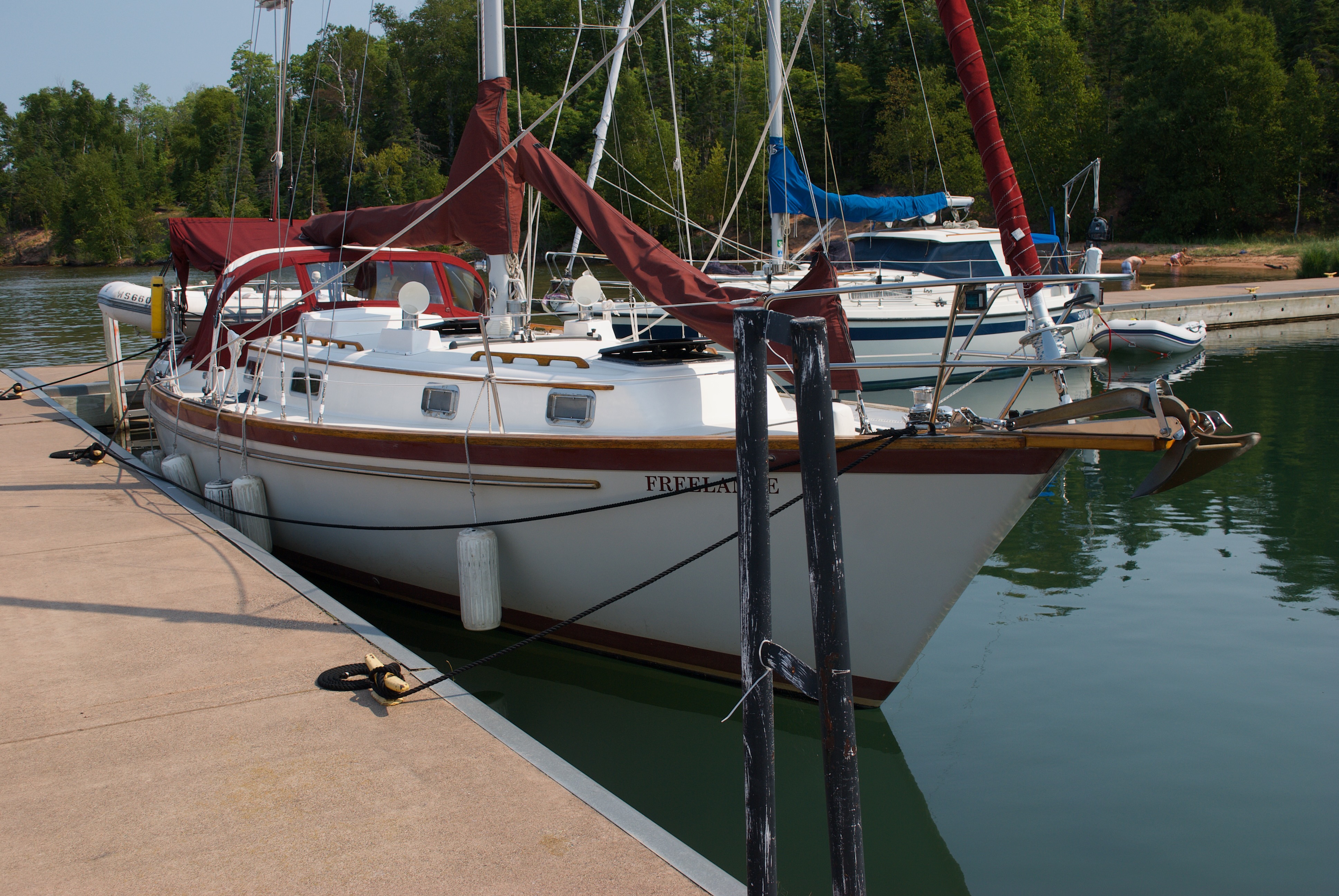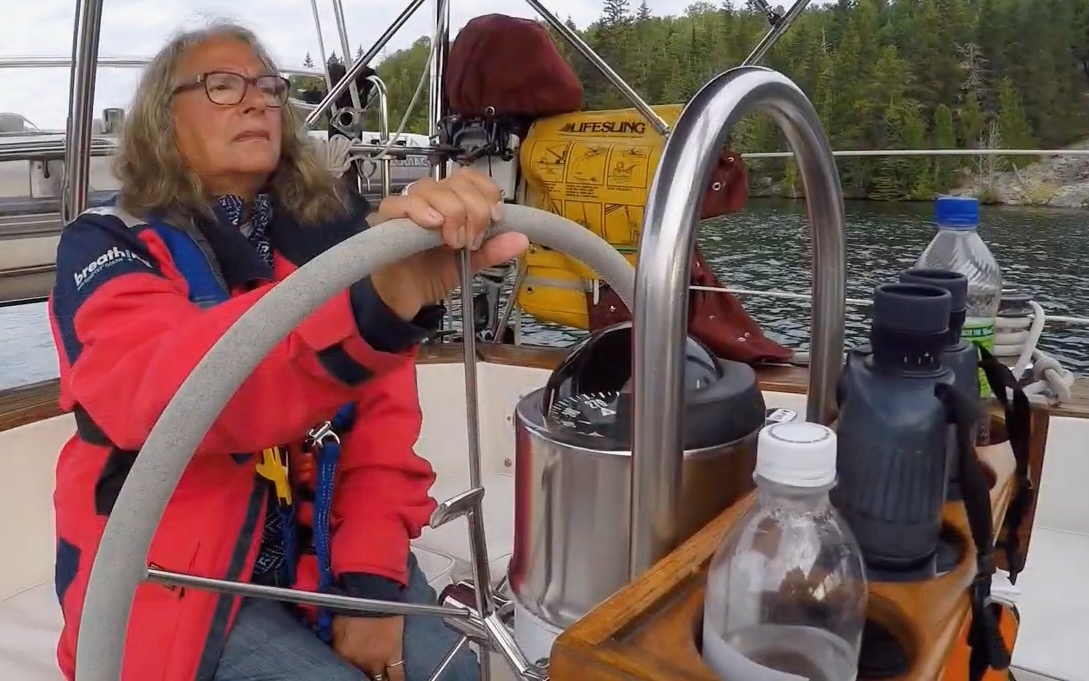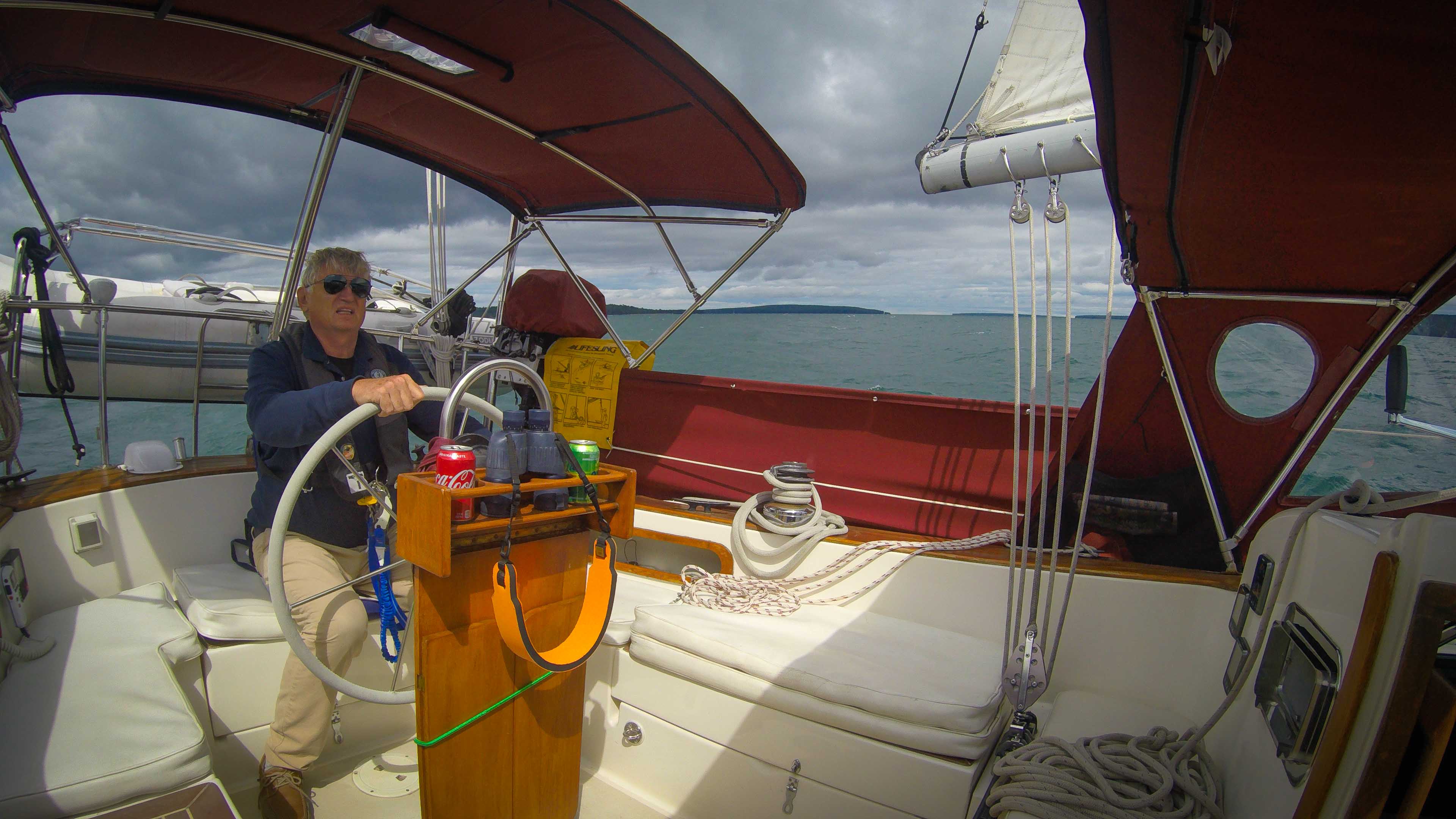GLCC has been a key to cruising adventures

Niels and Vicki Jensen
Current Boat: S/V Freelance (36’ Pierson)
Home Port: Bayfield, Wis. (S-192.5)
Joined GLCC: 2000
Role: Port Captains: Stockton Island, Wis. (S-191.5); GLCC Treasurer
Lifeline: You are from Denmark. Was boating always in your blood from an early age?
Niels Jensen: My family has strong connections all the way back to the Vikings. Through the years, a large number of my family members owned wooden freighters, did inter-island shipping in the Caribbean, worked as pilots, and even had privateer licenses in the Caribbean and Denmark. For the history buffs, a privateer license allows your vessel to be an auxiliary warship in partnership with the king – effectively having a legal license to raid enemy shipping.
My grandfather was always interested in sailing. I have vivid memories of accompanying him to marinas as a very small boy. He taught me about all the types of boats, their purpose, and the kind of adventures sailors were having. I grew up around motorboats, and often traveled on big and small ferry boats.
Lifeline: What brought you across the pond to the US?
When I was very young, I traveled extensively with my parents in Western Europe, North Africa, Turkey, etc. So, traveling was a normal activity for me. America offered a new opportunity to explore, and therefore was very interesting to someone like me, who really enjoys adventure.
I chose to come to the US and attend the University of Wisconsin – Eau Claire. The area has a large Scandinavian community, which was very welcoming and helped me immensely as I integrated into the culture, both from an academic and social perspective.
Most importantly, I met Vicki on my second day of college. How lucky is that!
Lifeline: When did you start your sailing adventures?
Both Vicki and I are very “outdoorsy” people. We loved taking our three kids camping, hiking, and skiing. In the late ’70s, we became interested in sailing. We gradually switched from family camping to family boating in the ’80s.
We started making sailing a priority the late ’80s, initially chartering boats anywhere from 29 to 46 feet. We were fortunate that the Lake Superior’s Apostle Islands had the largest concentration of charter boats in the United States, perhaps partly due to all the “crazy” Scandinavians from the Twin Cities, who gladly travel hours to the Bayfield area to sail. Superior Charters has a sizeable charter fleet at our home marina of Port Superior, offering both monohulls and catamarans as well as sailing instruction and certification (Lifeline note: Superior Charters offers discounts to GLCC members).
As noted, I come from a rather roaming family, so cruising was a natural extension of that. Vicki and I started cruising with our kids using Bonnie Dahl’s excellent cruising guide, Superior Way, which opened up Lake Superior to us as our backyard cruising ground.
We live in Minneapolis and commuted faithfully every weekend (every other weekend for Vicki as she worked two weekends a month) up to Bayfield. While we were working, those adventures were typically weekends with our 2-3 weeks of summer vacation allowing us to extend our cruising further into the big lake.
With our three kids, we spent many happy summers exploring the Apostles, Isle Royale, the South Shore, and the Canadian Northern Shore. Everyone learned to handle boats, with Vicki being an incredible and capable first mate.
With the whole family involved, responsibilities were shared, and we all enjoyed ourselves. What a great experience. We have so many memories of the family enjoying nature and connecting with each other. Priceless!
Vicki retired from nursing in 2010 and I ramped down my involvement in other activities about the same time. So, after 2010, we increasingly had opportunities to do more extensive traveling aka “roaming.”
Besides sailing on three of the Great Lakes on our sailboat Freelance, we have also sailed in the Bahamas, Caribbean, Denmark, Florida, and California, and typically spend time each year in Spain and Denmark.
Lifeline: Your professional career has included work as a journalist, magazine columnist, television producer, and media consultant. You also are a veteran of the Royal Danish Air Force. That is quite a varied background. Do you use any of that background in your cruising?
I have been fortunate to have enjoyed a diverse professional career. In Denmark, citizens are actively drafted to serve in the military. In the Danish Air Force, I worked with computers, and also received training as a backup air traffic controller.
A lot of things I learned during my time in the service translated well into my professional career in mass media and also to boating. Knowledge of electronics and radar is obviously most helpful, but also how a plane flies (lift) and is impacted by weather can be directly translated into sailing.
Lifeline: You’ve shared many of your adventures on YouTube.
In 2017, we wanted to share our cruising experiences with our family and friends. So, Vicki and I shot lots of video which, having a bit of background in media, I turned into YouTube videos.
What started out just to share with and stay connected with family has blossomed a bit. We now have 32 adventures posted on YouTube (https://www.youtube.com/@NielsJensenSailingSVFreelance) and, in total, garnered over 80,000 views!
Although we are by no means putting YouTube on fire, the number of views is pretty amazing to us. We especially appreciate it when people comment on how beautiful and special the Great Lakes and the places we visit are. Those comments inspire us to go out and explore even more, and turn those adventures into more episodes. I am humbled that the larger boating community takes interest and finds value in these.
Lifeline: How did you first become attracted to the GLCC in 2000?
They say life happens in phases.
When I started to wind down my involvement and leadership in Minneapolis-based Danish community organizations, sailing became our primary focus. That commitment was also based on Vicki and my wanting to explore further away areas in the Great Lakes.
Several friends had recommended the GLCC and introduced us to the value of the Harbor Reports. We found the Harbor Reports provided the knowledge and accurate information that allowed us to extend our cruising beyond Lake Superior. The local, in-person knowledge that the Reports offer provided us the confidence to try new areas. The Harbor Reports were a game changer for us.
The second year after we joined, the GLCC’s Annual Rendezvous was held at Gore Bay, Ont. With planning and the Harbor Reports, we felt very comfortable making the journey. The trip took about a month, with a round trip of about 800 nautical miles. We loved every minute of the journey and the opportunity to meet so many like-minded members at the Rendezvous. It was a wonderful experience.
Lifeline: You’ve held a number of positions with the Club. Any favorites, or ones you thought were the most impactful?
Vicki and I have been Port Captains of Stockton Island, Wis. (S-191.5) since 2007. Additionally, my past roles have included Director, Vice Commodore, Commodore as well as an editor of the Lifeline, supplement editor of the Harbor Reports, co-chair of a Rendezvous, and a member of many GLCC committees. I have been GLCC Treasurer since 2020.
We enjoy being a Port Captain and the opportunity to share the unique aspects of Stockton Island with GLCC members. Being Commodore was probably the most impactful and rewarding. I connected with members throughout all of five Great Lakes and enjoyed working with so many talented people on both sides of the border and seeing all the club offers valued by so many. As Commodore, you engage with everyone and have an opportunity to further the club based on your perspective and background – that’s what makes the Club so dynamic.
Lifeline: Any other observations about the Club?
I think there are some that have unfortunate misperceptions about the Club.
Its members certainly are not all intimidating “Goats.” We are a welcoming group that brings to the table all types of perspectives, backgrounds and experiences – that’s what makes the Club so interesting.
Lifeline: Any insights you could provide to GLCC members who might not have had an opportunity yet to do any significant cruising?
People boat differently depending upon a number of factors: time available, cruising area, and confidence. In a boating area where there are limited places to go to, then you do dinner cruises. If you are at a cruising ground like the Apostles, then you go out for a long weekend.
I think you need to treat the boat like a cabin or a waterfront condo: Make it a priority. If you had a cabin to get away for the weekend, that’s how you should look at your boat — and when you are there, you are supposed to go out. I am always amazed at how many people don’t leave the marina on a regular basis.
Of course, boaters should feel comfortable and confident. They should approach boating as a team / couple activity or as a family. Boating also offers a wonderful social activity where you have the ability to meet fellow boaters and make new friends. It’s a shame to miss that important aspect and benefit by not getting out of the marina.
Some don’t venture far because of lack of confidence. There are two things to be concerned about when boating – the boat, and you/your crew’s ability to handle the boat in varying conditions (aka confidence).
Lifeline: How important is confidence for a boater?
I hear many new inland sailors ask, “What about the risk of capsizing?” The reality is a cruising boat is nearly impossible to capsize. The boat can handle way more wind and wave conditions that we humans would ever be comfortable with. So that leaves us with confidence. So how does one obtain confidence? It’s through experience, training and repetition.
Perhaps only the skipper is experienced. That’s OK. The significant other can learn to run the radio, understand where and how to use any emergency gear, check the weather and learn, for emergencies, how to call for help to get back to dock, etc.
Redundancy gives you confidence and things become fun. The more all crew know how to do something (even as a backup), the more confidence you both have in boat handling and crew, and cruising becomes way more fun.
By the way, “boring” trips are great – they allow you to build experience, and experience builds confidence.
Lifeline: You’re saying, be smart and get out there.
As a boater, whether sailor or power, you have ultimate control, did you know that? By watching the weather, you can decide when, or when not to go out. Low-key cruising is OK.
When there is little or no wind, it is great for repetition (going in and out of the dock, etc.) and that builds confidence! Similarly, if the apps indicate high winds, it’s a great day to just hang out at the dock, do some boat projects, or visit with other boating friends.
Some people new to boating are concerned about deep water. That may be a perspective issue. For me, I like deep water, as I don’t need to worry about rocks! It’s the “hard stuff around the edges” (i.e., rocks) that boats don’t like and can ruin your day.
Lifeline: So, it’s important to explore.
Being on the Great Lakes, at least for Vicki and me, we don’t want to go to the same places over and over again – we would rather explore new places. There are so many fantastic places such as Isle Royale, the South Shore, Keweenaw, and Canadian North Shore – one of the most pristine wilderness areas in all the Great Lakes.
Flotillas and buddy-boating are also great ways to introduce cruisers to extending their cruising areas. Did you know that you can connect with other GLCC members and find a “Buddy Boat” in your area through the membership directory? You can search by Marina, Harbor Name, Region, etc.
What about attending one of the many regional events near you, maybe joining a flotilla? They will be posted throughout the summer, check them out here. Your area Rear Commodores and Port Captains stand ready to help point you in the right direction.
As a boater, you have the ability to go and see places that you can’t see from land. I suggest you view your boat as a magic carpet. It can take you anywhere! To make it comfortable, you need to expand your cruising range gradually. Remember we are boaters because it is fun and you don’t need to do wilderness cruising to begin. Try lunch on the hook or sailing to a new and nearby marina. If you can sail in the Great Lakes, you can sail anywhere.
Lifeline: Any favorite cruising spots or insights?
The Canadian North Shore of Lake Superior is absolutely spectacular, a true wilderness, not a wilderness with training wheels. I have often said that there is nothing like it in the world. Check out the Harbor Report and our YouTube videos here.
I look forward to seeing you out there! Look for my GLCC burgee and please stop by to say, “Hello!”



